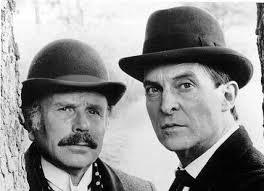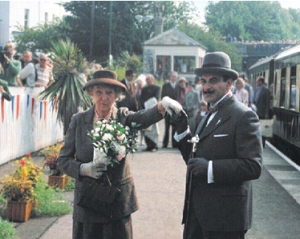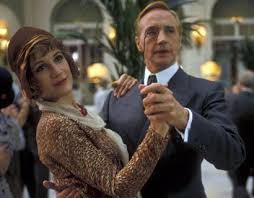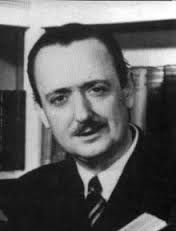In 1945 Agatha Christie was asked to write a piece on the Detective Writers in England by the Ministry of Information for publication in a Russian Magazine. When reading this article I was intrigued by her opinions on detective fiction as a whole and on specific writers and characters, especially her own serial sleuths. Some of her ideas I think have become dated, which is understandable, whereas others I think stand the test of time. Here’s a brief look at them…
Who reads detective stories you ask? Well according to Christie they are the ‘busy people, the workers of the world’. Particularly ‘highly placed men in the scientific world’ due to the puzzle, logic and reasoning aspects of detective stories. Christie also moots the idea that detective stories have ‘a sporting interest and is much less expensive than betting on horses or gambling at cards!’ All I have to say to that is that she hasn’t seen me in a second hand book shop! As to the other ideas she espouses here I think not only are they dated now, but I don’t think they were even accurate at the time as Stephen Knight (2003) suggests that for example women were equally voracious for detective stories as ‘lending libraries… [which] were the basic medium of dissemination of the new clue-puzzle novels had a 75 per cent female audience’ (Knight, 2003: 81). I feel perhaps other factors must have been involved in her writing this idea. Perhaps she wanted to elevate detective fiction in the eyes of her prospective Russian readers?
Holmes vs. Watson – who would you pick? Christie chose Watson as her preferred character, on the basis that he is ‘just himself – loveable, obtuse, faithful, maddening, guaranteed to be always wrong, and perpetually in a state of admiration.’ She even goes as far as suggesting that ‘we all need a Watson in our lives!’ I think for me though my choice would still be Holmes, for his maverick take on the world and his seemingly impossible deductions and to be honest I think I would tire of Watson’s constant ‘admiration.’
Poirot vs. Miss Marple? Christie’s thoughts on this have long been known, but in this article she compares her detectives’ plausibility. She is embarrassed at Poirot’s ‘calling in life,’ wondering ‘would anyone go and consult him?’ She thinks it highly unlikely and feels that ‘more and more, his entry into a murder drama has to be fortuitous.’ Conversely, Christie thinks Miss Marple in her village of St Mary Mead ‘is more happily placed,’ and that elderly spinster stereotypes provide a sufficient cover for her detective work. I suppose I have never thought about Poirot and Miss Marple’s plausibility too much, as I feel to varying extents, one always has to suspend reality when reading fiction, but I can see where Christie is coming from, as Miss Marple works within her niche effectively. You can hardly imagine her for example tackling the intrigues Poirot faces in The Big Four (1927).
So what other authors did Christie like?
1) Margery Allingham – ‘one of the foremost writers of detective fiction’. Christie liked Allingham’s strength in creating characters, though she never got on with Lugg, and her ‘power in creating atmosphere’. However, Christie did feel that Allingham sometimes ‘subordinate[d] plot to characters’. Do you agree? I have only read a few Allingham novels, with Tiger in the Smoke (1952) being my favourite so far. I concur with Christie that characterisation and atmosphere are some of Allingham’s strengths, although I wouldn’t say Allingham is a favourite author of mine.
2) Dorothy L. Sayers – ‘an exceptionally good detective story writer and a delightfully witty one’. Though Christie preferred Sayers’ earlier works such as Whose Body? (1923), Unnatural Death (1927) and The Unpleasantness of the Bellona Club (1928), as they had ‘greater simplicity and more punch to them’. Sayers’ quartet of Harriet Vane and Lord Peter Wimsey novels have often caused controversy with fans and Christie was no different believing that Wimsey’s marriage to Harriet made him ‘an example of a good man spoilt.’ This is something I disagree with and when I first read this quartet a few years ago I thoroughly enjoyed the will they, won’t they atmosphere. Aside from Gaudy Night (1935), I feel that the detective element of these novels was still strong and as a young woman I liked seeing Harriet carve out a space for herself in the world, maturing as she does so because it was something I can identify with.
3) H. C. Bailey – Christie enjoys Mr Fortune’s detective method, likening it to ‘the method of the knife, ruthless and incisive’. Though like others, Christie suggests Mr Fortune is best in his short story form rather than in novels. Bailey is one of the Golden Age authors I think has have not fared well over time and is not an author I have ever liked. I find Bailey’s narrative style rather slow and overly descriptive. But perhaps there are some readers of this post who would champion Bailey?
4) John Dickson Carr – A writer Christie called ‘a master magician… the supreme conjuror, the King of the Art of Misdirection’ in reference to his abilities with creating ‘impossible situation’ plots and she enjoyed the fantastical quality his stories have. She even describes Carr as a ‘male Scheherazade’ (The storyteller of One Thousand and One Nights), so good does she think his story telling skills are. Though antithetical to Allingham, Christie feels Carr’s characters are ‘not particularly good’. Between Dr Fell and Sir Henry Merrivale, Christie preferred the latter. I don’t feel I have read sufficient Carr to comment something I plan to remedy in coming weeks), though from what I’ve read I can vouch for the fantastical element.
5) Ngaio Marsh – Christie describes her rather unenthusiastically in comparison to Carr saying she is ‘another deservedly popular detective writer.’ Praise which seems rather impersonal, in comparison to the other writers she has discussed. Although Christie does pick out Surfeit of Lampreys (1941) (a novel I also really enjoyed), Death in Ecstasy (1936) and Artists in Crime (1938) as three novels of merit. From what I have read on other people’s blogs it seems Marsh’s reputation is not surviving so well with common complaints being that once the murder has been committed the investigations are usually not that interesting. This is an idea I am increasingly becoming aligned with, which is a shame as Marsh so often creates interesting set ups to begin with and has an eye for creating characters.
6) Anthony Berkeley – ‘Detection and crime at its wittiest – all his stories are amusing, intriguing, and he is the master of the final twist.’ All things I entirely agree with, with Trial and Error (1937) and The Poisoned Chocolates Case (1929) being favourites of mine. Although I think Berkeley’s satire and ability to create twists is perhaps more strongly seen in his works published under the name Francis Iles such as Malice Aforethought (1931) and Before the Fact (1932).
Freeman Wills Crofts, Michael Innes, John Rode and Gladys Mitchell are also briefly singled out as other ‘good detective writers’. Though I fear (based on my reading of other blogs) there will be some readers of this post who will disagree with these final four, especially Innes and Mitchell who can be quite divisive. I myself probably wouldn’t include Crofts, finding Inspector French’s methods very painful to read. By and large I would agree with Christie’s choices such as her inclusion of Allingham, Sayers, Carr and Berkeley. Although for me personally I would question her choice of Bailey and would probably have swapped him for Mitchell, out of the other authors she mentions.
What do you make of Christie’s choices? Is there anyone you feel has been (unjustly) left out? Do you think writers such as Nicholas Blake, Edmund Crispin, Cyril Hare, Mavis Doriel Hay or Alan Melville deserved a mention?
Christie’s article ends by returning to her own work highlighting how the tightness of detective fiction plots ‘is good for ones thought processes,’ but that as the years have progressed she has looked beyond the construction element of detective stories and has ‘become more interested… in the preliminaries of crime – the interplay of characters, the deep smouldering resentments, dissatisfactions that do not always come to the surface but which may suddenly explode into violence.’ I think this was certainly the case with Five Little Pigs (1942) and Towards Zero (1944), two novels she had written in years recent to the article, with the psychology of her characters, being a larger component. Though I still feel plots and creating twists and surprises was still a large part of Christie’s writing.
Finally, Christie’s advice to young writers? ‘Be very careful what central character you create – you may have him with you for a very long time!’ Poor Poirot! She really didn’t like him did she?

Bibliography
Knight, Stephen. (2003). The Golden Age. In: Priestman, M. The Cambridge Companion to Crime Fiction. Cambridge: Cambridge University Press. pp. 77-94.






This is a great post. Would you mind Going over to the Agatha ChristievReading Challenge Blog Carnival and adding this URL to the Mr Linky there? It will be a great addition to the carnival. Thanks.
LikeLiked by 1 person
Thanks and I have added to the AC Reading Challenge Blog Carnival
LikeLike
I enjoyed this very much. Another author Christie loved was Elizabeth Daly, someone I really have to start reading. I, for one, enjoyed Christie’s shift toward focusing on the “pre-show” to murder. Towards Zero and Five Little Pigs are two of my favorites. Sometimes it backfired a little bit, though: I think the earlier parts of Taken At the Flood are more interesting than the murder itself. And in the end, when Christie’s powers had all but failed her, the bits in between the murders were sometimes the only parts worth reading.
LikeLiked by 1 person
Daly is also someone I’ve been thinking of trying, although I never knew Christie liked her.
LikeLike
It has been my privilege to work with some ‘highly placed men in the scientific world’ and I can assure you that none of them – not a single one – would go anywhere near a detective novel if their lives depended on it! Maybe Christie was trying to wrong-foot the Ruskies, to give the impression of strategic defences lowered while important personnel feverishly pored through novel after novel, allowing spies to flock in by the boatload so long as they found out who the poisoner was.
And do her choices actually reflect Christie’s true feelings? I mean, is she going to publically spurn her peers and fellow Detedction Club members (and, indeed, underlings, since she was president for a while…)? I don’t think you ever get a true idea of an author’s tastes from what they say in public, there’s too much face to lose. Some of the blurbs authors have given to books which turned out to be complete pish belie this: I really can’t help but treat all of this sort of thing with enough salt to give a rhinocerous a coronary.
However, a very interesting post once again, Kate. Forgive this outpouring of cynicism.
LikeLiked by 1 person
Haha, I love your interpretation of why Christie suggested scientific men liked detective fiction. So wish it was true now. I think though that Christie may have been a bit more truthful in her opinions in this article, mainly because it was for a Russian market and therefore not likely to translated and therefore read by English readers, including any from writers from the Detection Club. The only place I know it to occur in print in English is in the new reprint a few years ago of Ask a Policeman. However, I can see from where you’re coming from and definitely like your choice of imagery. Also I was thinking you wouldn’t be impressed with Christie’s selection of Mitchell and Marsh in her choices for good writers…
LikeLiked by 1 person
Aah, you make a good point (but I still think it unlikely that she wouldn’t recommend people she knows well/sees a lot of…). With regards to Mitchell and Marsh, the important thing is that she (publically said she) liked JDC – nothing else matters!
LikeLiked by 1 person
well you’ll be glad to know that out of all the writers she talks about, he gets the most written about him.
LikeLike
I don’t think you ever get a true idea of an author’s tastes from what they say in public, there’s too much face to lose. Some of the blurbs authors have given to books which turned out to be complete pish belie this
I think you’re probably right. Authors are as human as anyone else. In general they don’t like to say negative things about other authors who happen to move in the same social circles.
Authors are also notoriously bad at judging their own work. Poirot is one of the great characters in fiction. Miss Marple is much less interesting.
LikeLiked by 2 people
Yeah I’ve always thought Poirot a great detective too, though I suppose we didn’t have to write tens of novels featuring him, so it’s perhaps different if you are the writer. I actually really like Miss Marple and having done research on her character have found her to be an instrumental stepping stone in the changing nature of female detectives in fiction. Birgitta Berglund wrote an interesting chapter involving this in Chernaik’s The Art of Detective Fiction called ‘Desires and Devices: On Women Detectives in Fiction’.
LikeLike
What I love about Poirot is the way he makes Christie step outside of herself; as the books go on and she becomes an older woman, the old woman detective suddenly seems to represent less of an authorly leap, and it feels almost too comfortable (love Mirror Crack’d though I undeniably did). The differentness of Poirot certainly brought out Christie’s inventive side more, and she was always her most enjoyable when being inventive.
LikeLiked by 1 person
Interesting point you make, I hadn’t thought of it like that.
LikeLike
Love this post! I like how you take Christie’ responses and give them your own twists and insights. I definitely think Crispin and Hare deserved a mention!
LikeLiked by 1 person
Glad you enjoyed it and yeah I would much rather had Crispin and Hare in the list than say Bailey or Crofts.
LikeLike
Nicholas Blake is creepy, nihilistic and cynical. And horrifyingly elitist. Avoid at all costs. Almost as bad as Gladys Mitchell, although she’s bad in a different way. Mrs Bradley is a monster.
LikeLiked by 1 person
I haven’t read any biographies on Blake so I can’t comment on whether he is creepy, nihilistic, cynical or elitist, although having read most of his Nigel Strangeway series I can’t say I found those qualities excessively present. I wouldn’t say Mitchell is a favourite of mine, as her plots are a bit baffling, but I thought Speedy Death was a good novel. To be honest I can’t quite see how Mrs Bradley is a monster, the imagery used to describe her does give her a rather chimera like quality and her execution of justice can be unconventional (but this can be said for many detectives), but I wouldn’t think of her as a monster. Perhaps you could elaborate on how she is?
LikeLike
Why do you find Blake creepy, nihilistic, cynical and elitist? How much Blake have you read? I certainly wouldn’t call him elitist; his early books are decidedly left wing. Later books I’ll grant can be a bit dour, rather like P.D. James – The Worm of Death or A Tangled Web, for instance.
Would you mind explaining why you think Mitchell is bad, and Mrs Bradley a monster? Mitchell’s one of the sanest, most level headed writers; there’s a cheerful, tongue in cheek common sense to her books, and Mrs Bradley is one of the most likeable sleuths in the business.
LikeLiked by 1 person
Fascinating – the article sounds like a real find. Funny to think of Marple making more sense as a detective than Poirot, I love her saying no-one would consult him.
LikeLiked by 1 person
The article can be found in the latest reprint of Ask a Policeman and yeah I had never thought about whether Marple or Poirot was more plausible, but I can see where Christie was coming from.
LikeLike
Regarding what JJ said above about Christie growing older: perhaps that’s why Mrs. Ariadne Oliver became a much more prominent “Watson” to Poirot during his later period. She was certainly an obvious stand-in for the author himself, and I think it is to Christie’s credit as a creator of character that Mrs. Oliver in no way resembles Miss Marple. I also think it interesting that Christie preferred Watson to Holmes, given that she created one of the drippiest Watsons of all in Captain Hastings. He sort of makes the real Dr. Watson seem like Einstein in comparison!
LikeLiked by 1 person
I think perhaps it is Oliver’s occupation as a mystery writer which helps to keep her and Miss Marple distinct, as it kinds of gives her a different excuse for sleuthing and yes thinking on it Hastings is definitely a drippy Watson!
LikeLike
I think Christie was constantly trying to come up with a more satisfactory sleuth. Each of her major detectives had a different style but she also used a variety of foils to show the best qualities of each. Some detectives lasted only a story or two while others were more developed
LikeLiked by 1 person
It’s an interesting point you make about the use of foils, as Poirot has Hastings and Japp, Tommy and Tuppence sort of foil each other, but I think Miss Marple doesn’t necessarily have the same foil each time, I think her foils are the official detectives in general, who go about trying to solve the case in quite different ways to her.
LikeLike